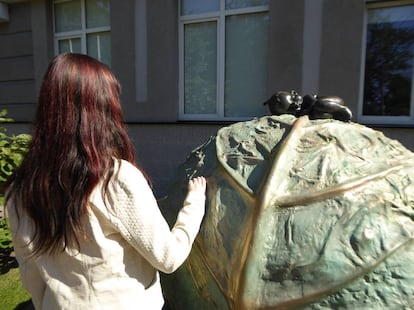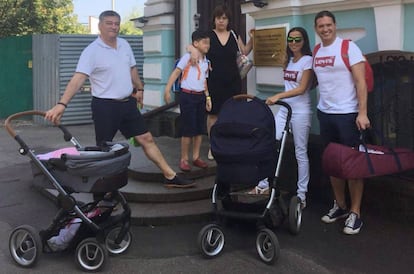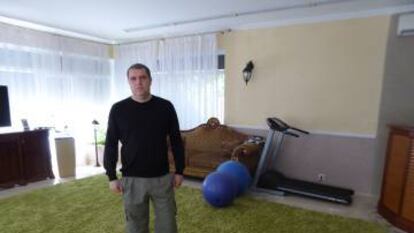The dark side of Ukraine’s surrogacy boom
Lack of oversight, lax regulations and a failing economy have made the eastern European country one of the most popular destinations to find a surrogate mother

Angela grew up in an orphanage. She was brought there at the age of six and left at 18, pregnant with her first child. The boy is in school now, while her second child, a five-year-old, plays in a park beside her in the outskirts of Kiev in Ukraine. There is a clinic beside the park and it is here where Angela, which is not her real name, will have an American couple’s embryo inserted into her womb. It is something she has difficulty talking about.
The 26-year-old doesn’t want people to know who she is or where she is from. But she does want them to know that the father of her two children is no longer in the picture. Angela had to give up her third baby for adoption two years ago. She believes this time it will be easier to give up the baby because it won’t be hers.
Angela works as a cook and says it would take a long time to buy a home on her salary: “I grew up without a home. It’s important for me to have an apartment of my own. This is the only way I can do that.”
The average surrogate receives between €10,000 and €14,000
Sitting next to Anna is Angela, the 32-year-old hairdresser from California who has contracted Anna to be her surrogate. “Four years ago after giving birth I had terrible bleeding. They removed my uterus and I can’t get pregnant anymore,” she says. “I can afford to do this here but not in California [where it is also legal, but costs €120,000.]”
Angela and Anna have reached an agreement in an industry that is built on the desire of thousands of couples to be parents and women’s need, some greater than others, for money. In Ukraine, a complex network of third parties have stepped in to connect these two needs, turning the country into one of the most popular surrogacy centers in the world.
Ukraine’s Health Ministry doesn’t keep official records of surrogacy. Nor are there available statistics. In Ukraine, future parents are shown catalogues with photos of women and their general information from which they can pick a surrogate or an egg donor. They can choose the sex of the baby – which is illegal in Spain – and do not need to pass any controls. To hire a surrogate, the couple just needs to prove they are legally married and can’t have children, although one of them must have a genetic link to the child. In a country where the law is so lax, “it’s as if there were no regulation at all,” says one Ukrainian deputy.
Anna has rented an apartment for Angela and her children in the outskirts of Kiev, where she will live for the next nine months. She wants her to be close to hospitals and the clinic that is overseeing the process. Angela will not have to work during this period of time. Asked how much she is charging, Anna jumps in: “Around €20,000, which includes rent, food and clothes.” It’s more than the average fee, which is typically between €10,000 and €14,000. Angela doesn’t say anything. This will be her first time as a surrogate. “I decided to give up my (third) child when I was pregnant. I didn’t speak to him, I didn’t stroke my belly. I will do the same thing now,” she says seriously.
We don’t want to be seen as a country where you can fly in, choose a woman and have a baby
Ukrainian deputy Iryna Sysoyenko
The public squares in downtown Kiev are filled with people dining in sidewalk cafes and restaurants. But despite the modern, vibrant scene, posters recruiting soldiers are a reminder of the revolution that broke out just four years ago, followed by the Russian annexation of Crimea, and of the fact that Ukraine’s border is still a war zone today. Ukraine’s currency, the grivna, plummeted as a result of the crisis and while authorities boast of 2.5% economic growth, Ukrainians complain of precarious working conditions and low salaries – the average is €237 a month.
Widespread corruption has made matters worse, creating the perfect conditions for the surrogacy industry to thrive. “From 2014, businesses with foreign capital began to set up in Kiev and buy Ukrainian clinics and agencies,” says lawyer Sergii Antonov. “The boom happened in 2015. Foreigners started to be the main clients. Thailand and India banned the practice and the demand moved here. The financial crisis meant that there were more women willing to be surrogates.”
Antonov estimates that between 2,000 and 2,500 surrogacy contracts are signed each year in Ukraine. The process normally involves multiple third-party agencies which receive a commission for their work. In theory, clinics should only take care of the medical side of things but often they are linked to other agencies that pass on clients and women who want to be surrogates. They also provide translators, lawyers and look for accommodation for the future parents. All for packages priced between €39,900 and €49,900.
But not all surrogacy processes go according to plan. Stanislav Kutsenko, the head of territorial administration of the Justice Ministry in Kiev, says that “in the last two years, around 40 or 50 women have come to us saying they wanted to keep the baby after giving birth. We find ourselves in the situation of explaining to them that they have no rights over the child.” Kutsenko believes greater regulation is needed, and wants surrogacy contracts to protect the rights of surrogate mothers.
Ukrainian deputy Iryna Sysoyenko agrees. She has co-authored a bill to ban foreigners from using surrogates, or at the very least to stop couples from countries where the practice is illegal, like in Spain. The proposal, which will be voted on in November, wants to make the industry less commercial. “We don’t want to be seen as a country where you can fly in, choose a woman and have a baby,” she says. Another parliamentary group is working on a draft law to “protect the rights of egg donors, surrogates and children.”

A Spanish family wanders around outside a public maternity ward in Kiev. They are one of the 45 Spanish couples who were unable to return home after using the clinic Biotexcom for their surrogacy process. The Spanish embassy refused to issue a passport for their babies until it could rule out possible human trafficking, leaving them in limbo for almost two months. Before going down the surrogacy route, the Spanish couple says they tried various unsuccessful treatments, and adoption. “This was not a whim,” says the woman. “It is our last chance to fulfill our dream of being parents,” he adds. The couple explain they keep in touch with the surrogate mother via video chat and saw her after the birth, “she’s not poor, she’s a cook,” they explain.
It’s not difficult to find Spanish couples who have come to Ukraine to use a surrogate. In the entrance to one of the main surrogacy clinics, Biotexcom, two couples look like they have come straight from the airport. Biotexcom controls two thirds of the surrogacy market with foreigners. Pregnant women are visible everywhere in the high-security facility. In one examination room alone, there are 22. The center closed for a few weeks in August. According to the company, it was for an annual clean-up but it happened just after Biotexcom’s owner, Albert Totchilovski, was put under house arrest over child trafficking and tax evasion accusations.
The hospital told me the fetus had been dead for two weeks. The clinic only gave me €300
Surrogate mother Maria
Maria, 30, had a bad experience with Biotexcom five years ago when she decided to be a surrogate. “I needed money because I had just got divorced,” she says. “Seven weeks into the pregnancy, I experienced heavy bleeding. I called the clinic and they told me everything was normal. Fifteen days later I had more heavy bleeding. The hospital told me the fetus had been dead for two weeks. The clinic only gave me €300. I took me two months to recover. It was very hard and very sad.”
Maria, who has a diploma in chemistry and ecology, tried again last year. “I was working in a cafeteria. I was not in need, but I wanted money so I could move out of my parents’ house with my daughter,” she explains. This time she went to a different clinic. “They treated me like a human being. It was nothing like the first time where I felt like a piece of meat. Before the process, they gave me a psychological examination and I met the parents after signing the contract.”
Biotexcom has been linked to various scandals across Ukraine for some years, but it was the human trafficking and tax evasion charges that raised alarm bells at the Spanish embassy in Kiev and put a hold on baby registrations. The investigation will also reopen older cases involving the company, says the prosecutor overseeing the case.
“We believe the Italian couple who left Ukraine in 2011 with a baby that had no genetic link to them is not an isolated case,” they say. The prosecutor wants permission to conduct 200 DNA tests in countries across Europe and in China to investigate whether more children have been victims of trafficking.
Totchilovski is also being investigated for tax evasion. Biotexcom only has $200,000 in equity when it should have earned at least €30 million in the past three years, says the prosecutor, who suspects the money has been sent to tax havens in Cyprus and Lithuania.
Spanish couples who went through Biotexcom are being recommended to do a DNA test to see whether they have been the victims of fraud.
But despite the scandals, Spanish couples continue to flood in each week to pick up their babies from Ukraine. “If there are abuses they should be punished,” says Cristina, one of the women affected by the embassy holdup who used Biotexcom. “We shouldn’t demonize the process. We did it within the law of this country and if they believe there are no safeguards, they should put in the necessary controls,” she adds.
English version by Melissa Kitson.
Who is Albert Totchilovski?

Albert Totchilovski, the owner of Biotexcom, lives in a large home in Kiev. Inside his spacious living room there is a large green rug, a pilates ball, two sofas and an empty bar. Two security guards and a German shepherd guard the room.
According to Totchilovski, Biotexcom controls one fourth of the global surrogacy market and 70% of the market in Ukraine. He has built an empire offering couples the chance to be parents with packages that start from €39,000. Now he is facing between eight and 15 years in prison for child trafficking and tax fraud. But he doesn't seem too worried, even though he is under house arrest.
He admits that the Italian couple who left Ukraine with a baby had no genetic link to them."We received the sperm sample from another clinic, but no one has cared about the case since 2011 although the police knew about it. Now they are beginning an investigation about nothing."
On the accusations of tax evasion, he says: "They want to collect money from businesses for next year's elections. That's the mentality here."
Totchilovski has dual German and Moldovan citizenship, but little it known about his background or how he got the money to get into the surrogacy industry. "I had nightclubs in Moldova and then I emigrated to Germany. I had no money there. I worked in a glassworks shop," he says.
He is also not worried about the proposed law to ban foreigners from using surrogates in Ukraine. If the law goes through, Totchilovski will move to the biotechnology sector: "the production of organs," he says proudly.
